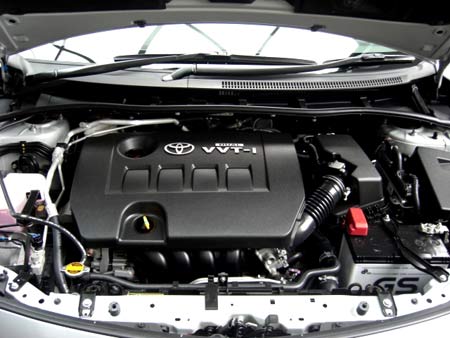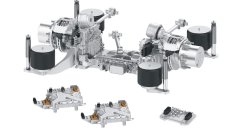What is the Corolla Altis Dual VVT-i about?
The Indonesian market has a firm relation with Toyota vehicles and Japanese manufacturer has dropped yet another variant of the best selling Corolla Altis in the market.
The 2.0 Dual VVT-i variant features only a new radiator grille, but only when you open the bonnet you find the rational explanation to the word "Dual" on the badge.
Who the heck is Dual VVT-i? Is this the same case as Hero Honda Splendor and Splendor+ with fuel tank stickers seperating the two?
Generally, the term dual on a car is implied as a dual-fuel engine that is capable of handling fuels of different nature. But not this one though.
The Dual VVT-i is two VVT-i meaning both the inlet and exhaust valves obtain variable valve timing capabilities. The regular Corolla Altis, like the one sold in India is equipped with VVT-i only for the intake valve, so only the volume of mixture entering the engine can be controlled by altering the duration of valve in open condition.
According to you, what could be the advantages?
With the Dual VVT-i technology, the flexibility is enormous, and the regulated delay and advancement of the exhaust valve timing improve throttle response and minimize fuel wastage and emissions brought about by it. At lower revs, the valve shuts sooner and at higher revs it is otherwise. The driver will be able to feel the change.
OK, that's enough. Tell me how Toyota feels this is advantageous?
Yes. Toyota knows more than the technical staff in Indian Autos Blog, so let's hear to the actual advantages of this engine
- Balanced output and better performance
- high fuel efficiency and cleaner emissions
- better control in terms of shifting, steering responsiveness and stability (eh?)
- improved safety (what??)
According to you, how could a bigger displacement engine enhance steering response and safety?
Could a more powerful engine help the power steering pump (which in general is considered a safety device) in functioning better? This is confusing. Is this some kinda marketing gimmick?
Tell me about Toyota's justification
Balanced output and better performance- is achieved as valve timing is greatly optimized according to the engine’s operating conditions. This permits for higher torque in low to mid rpm ranges and intensified output at high rpm, resulting to exceptional acceleration. With a flat torque rapidly generated, the new Altis accelerates smoothly and more effectively.
Higher fuel efficiency and cleaner emissions- Fuel efficiency is maximized and emission gases are reduced as the size and weight of the valve train and pistons were lessened to reduce friction of parts.
better control in terms of shifting, steering responsiveness and stability- Intelligent transmission supplies smoother shifting, armed with a paddle shift for better manual transmission-like shifting when in sequential mode. The paddle shift likewise, heightens safety as drivers keep both hands on the steering wheel, escalating control and focus.
improved safety- the bigger body and more rigid suspension provides augmented stability, better steering response, enhanced control and safer drive. With great acceleration from a standing start, the driver can maneuver the vehicle quickly and safely.

What else is different on the Corolla Altis Dual VVT-I?
Toyota has added a start button that comes only on the premium models. A smart key system with key-integrated trunk release function is also new on the Corolla Altis. The new Altis also receives visual relief in the form a 3-spoke alloy wheel compared to the regular 4-spoke one.
Specifications of Toyota Corolla Altis 2.0 Dual VVT-i 3ZR-FE
Capacity: 1987cc
Bore x Stroke: 80.5 mm x 97.6 mm
Compression ratio: 10:1
Technology Support: Dual VVT-i and ETCS-i
Recommended Fuel Type: Gasoline RON 97 (PERTAMAX)
Maximum power: 153ps / 5600rpm
Maximum Torque: 21.3 kgm / 4400rpm
Source - Rini Sumasdi via Tsikot














